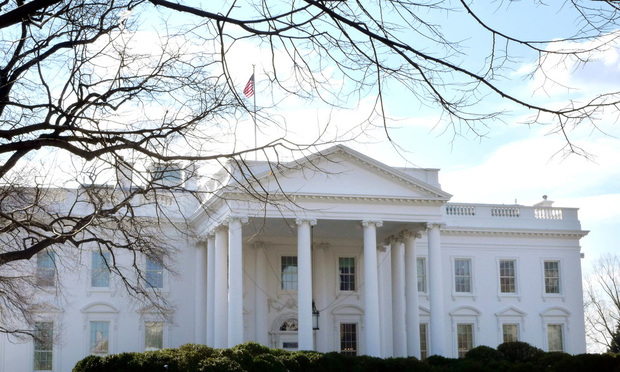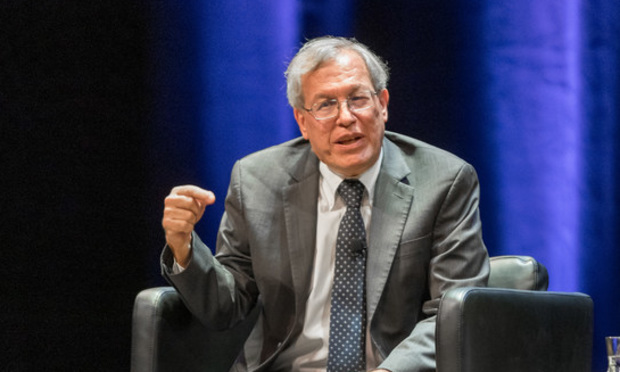'Strongly Disagree': 300 Law Professors Criticize Cipollone's Opposition to Impeachment
The law professors claim that White House counsel Pat Cipollone's letter "fails to recognize the seriousness of the charges against President Trump for abusing executive power for personal political gain and violating federal election law."
October 18, 2019 at 02:55 PM
5 minute read
 The White House. Credit: Diego M. Radzinschi
The White House. Credit: Diego M. Radzinschi
More than 300 legal scholars are speaking out against White House counsel Pat Cipollone's letter refusing to cooperate with the U.S. House's impeachment inquiry, saying they "strongly disagree" with Cipollone's claims that the inquiry is unconstitutional.
The White House counsel faced almost immediate criticism from the legal community over his Oct. 8 letter to the House, in which Cipollone argued that the impeachment inquiry "violates the Constitution, the rule of law, and every past precedent." He said the White House wouldn't engage with the inquiry until the entire House passed a resolution authorizing the proceedings.
That backlash advanced again Thursday, when an open letter signed by the hundreds of law professors said they "strongly disagree" with the White House counsel's assertions.
"Quite the contrary, the Constitution does not mandate the process for impeachment and there is no constitutional requirement that the House of Representatives authorize an impeachment inquiry before one begins," the law professors' letter reads. "Cipollone wrongly condemns the impeachment inquiry as the House 'seeking to overturn the result of the 2016 election.' This fails to recognize the seriousness of the charges against President Trump for abusing executive power for personal political gain and violating federal election law."
 UC Berkeley School of Law Dean Erwin Chemerinsky. (Photo: Jason Doiy/ALM)
UC Berkeley School of Law Dean Erwin Chemerinsky. (Photo: Jason Doiy/ALM)Erwin Chemerinsky, the dean of the University of California Berkeley, School of Law, who authored the letter, said Friday that he thought it was important to publish the letter because "law professors need to be heard on this."
"Statements of law were being made that were just wrong," he said.
Chemerinsky said he wrote the letter about a week ago, and that it was circulated by the American Constitution Society for signatures. However, Chemerinsky added, he's been "deluged with emails" from other law professors interested in signing.
The dean also criticized those who have made suggestions that a president can't be impeached in an election year, calling such claims "nonsense." While Chemerinsky didn't specifically name him, John Yoo—also a law professor at Berkeley Law—faced criticism for making that claim during a Fox News appearance this week.
Federal agencies like the Pentagon and the Office of Management and Budget have refused to hand over documents for the inquiry, and Vice President Mike Pence and Trump's personal attorney, Rudy Giuliani, have also not complied with subpoenas, in line with Cipollone's directions.
However, Cipollone's letter does not seem to have much staying power when it comes to witnesses testifying in the inquiry.
Both current and former Trump administration officials have been showing up at the House since the letter was issued, testifying for hours behind closed doors about what they allegedly witnessed at the State Department and White House over the withholding of military aid from Ukraine in exchange for investigations into former Vice President and 2020 Democratic presidential candidate Joe Biden and his family.
After the Trump administration tried to block testimony for some witnesses, committee chairmen overseeing the inquiries quietly issued subpoenas for the witnesses—and they seem willing to comply.
A subpoena was issued for former U.S. Ambassador to Ukraine Marie Yovanovitch after State Department officials, "at the direction of the White House," told her not to appear at a voluntary interview, according to committee chairmen.
EU Ambassador Gordon Sondland is also among those who testified behind closed doors, meeting with the committee Thursday. Secretary of State Mike Pompeo at first blocked Sondland from appearing at a voluntary interview, but the ambassador agreed to an interview with the committees after a subpoena was issued.
However, Sondland's legal team at Paul Hastings, attorneys Robert Luskin and Kwame Manley, wrote in a letter to lawmakers Thursday that Sondland couldn't comply with a request for documents because the papers are under State Department control.
"Ambassador Sondland has encouraged the State Department to provide the committees with the requested documents in advance of his deposition. He strongly believes that disclosure will lead to a more fulsome and accurate inquiry into the matters at issue and will corroborate the testimony that he will give in key respects," the letter, obtained by multiple news outlets, reads. "However, the choice is not his to make, and so we must regretfully decline to produce the documents that the committees have requested from Ambassador Sondland."
The White House faces its own subpoena deadline Friday, but it's all but certain to defy the congressional mandate.
Read more:
16 Conservative Lawyers Say They Support 'Expeditious' Impeachment Inquiry
'The Court is Not Persuaded': 2 Judges Question OLC's Policy Against Indicting a Sitting President
This content has been archived. It is available through our partners, LexisNexis® and Bloomberg Law.
To view this content, please continue to their sites.
Not a Lexis Subscriber?
Subscribe Now
Not a Bloomberg Law Subscriber?
Subscribe Now
NOT FOR REPRINT
© 2025 ALM Global, LLC, All Rights Reserved. Request academic re-use from www.copyright.com. All other uses, submit a request to [email protected]. For more information visit Asset & Logo Licensing.
You Might Like
View All
Trump Administration Faces Legal Challenge Over EO Impacting Federal Workers
3 minute read
US Judge Cannon Blocks DOJ From Releasing Final Report in Trump Documents Probe
3 minute read
Private Equity Giant KKR Refiles SDNY Countersuit in DOJ Premerger Filing Row
3 minute readTrending Stories
- 1Pogo Stick Maker Wants Financing Company to Pay $20M After Bailing Out Client
- 2Goldman Sachs Secures Dismissal of Celebrity Manager's Lawsuit Over Failed Deal
- 3Trump Moves to Withdraw Applications to Halt Now-Completed Sentencing
- 4Trump's RTO Mandate May Have Some Gov't Lawyers Polishing Their Resumes
- 5A Judge Is Raising Questions About Docket Rotation
Who Got The Work
J. Brugh Lower of Gibbons has entered an appearance for industrial equipment supplier Devco Corporation in a pending trademark infringement lawsuit. The suit, accusing the defendant of selling knock-off Graco products, was filed Dec. 18 in New Jersey District Court by Rivkin Radler on behalf of Graco Inc. and Graco Minnesota. The case, assigned to U.S. District Judge Zahid N. Quraishi, is 3:24-cv-11294, Graco Inc. et al v. Devco Corporation.
Who Got The Work
Rebecca Maller-Stein and Kent A. Yalowitz of Arnold & Porter Kaye Scholer have entered their appearances for Hanaco Venture Capital and its executives, Lior Prosor and David Frankel, in a pending securities lawsuit. The action, filed on Dec. 24 in New York Southern District Court by Zell, Aron & Co. on behalf of Goldeneye Advisors, accuses the defendants of negligently and fraudulently managing the plaintiff's $1 million investment. The case, assigned to U.S. District Judge Vernon S. Broderick, is 1:24-cv-09918, Goldeneye Advisors, LLC v. Hanaco Venture Capital, Ltd. et al.
Who Got The Work
Attorneys from A&O Shearman has stepped in as defense counsel for Toronto-Dominion Bank and other defendants in a pending securities class action. The suit, filed Dec. 11 in New York Southern District Court by Bleichmar Fonti & Auld, accuses the defendants of concealing the bank's 'pervasive' deficiencies in regards to its compliance with the Bank Secrecy Act and the quality of its anti-money laundering controls. The case, assigned to U.S. District Judge Arun Subramanian, is 1:24-cv-09445, Gonzalez v. The Toronto-Dominion Bank et al.
Who Got The Work
Crown Castle International, a Pennsylvania company providing shared communications infrastructure, has turned to Luke D. Wolf of Gordon Rees Scully Mansukhani to fend off a pending breach-of-contract lawsuit. The court action, filed Nov. 25 in Michigan Eastern District Court by Hooper Hathaway PC on behalf of The Town Residences LLC, accuses Crown Castle of failing to transfer approximately $30,000 in utility payments from T-Mobile in breach of a roof-top lease and assignment agreement. The case, assigned to U.S. District Judge Susan K. Declercq, is 2:24-cv-13131, The Town Residences LLC v. T-Mobile US, Inc. et al.
Who Got The Work
Wilfred P. Coronato and Daniel M. Schwartz of McCarter & English have stepped in as defense counsel to Electrolux Home Products Inc. in a pending product liability lawsuit. The court action, filed Nov. 26 in New York Eastern District Court by Poulos Lopiccolo PC and Nagel Rice LLP on behalf of David Stern, alleges that the defendant's refrigerators’ drawers and shelving repeatedly break and fall apart within months after purchase. The case, assigned to U.S. District Judge Joan M. Azrack, is 2:24-cv-08204, Stern v. Electrolux Home Products, Inc.
Featured Firms
Law Offices of Gary Martin Hays & Associates, P.C.
(470) 294-1674
Law Offices of Mark E. Salomone
(857) 444-6468
Smith & Hassler
(713) 739-1250











